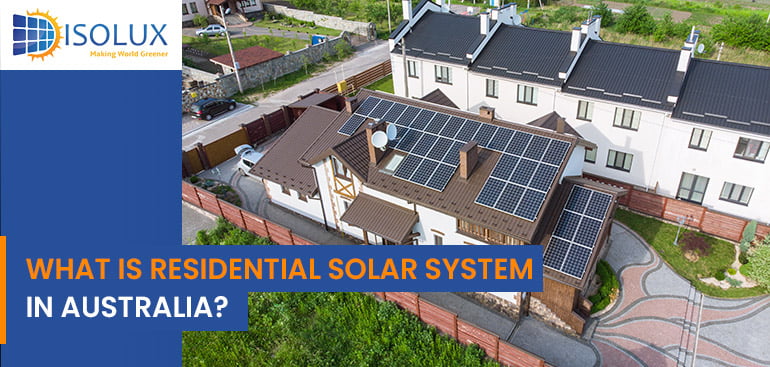Australia is known for its abundant sunshine, which makes it a perfect place for the widespread adoption of solar energy. Over the years, residential solar has become increasingly popular, with homeowners looking to reduce their carbon footprint and save on energy bills. In this article, we will explore the various benefits of the residential solar system in Australia and why it has become a popular choice for homeowners.
Benefits of Residential Solar in Australia
Cost Savings
One of the primary benefits of residential solar energy is the cost savings it offers. By installing a solar energy system, homeowners can significantly reduce their energy bills. Solar panels convert the energy from the sun into electricity, which can be used to power homes, reducing the amount of electricity that needs to be purchased from the grid. In addition, the cost of solar panels and related equipment has decreased significantly in recent years, making it an affordable option for homeowners.
Environmental Sustainability
Another benefit of residential solar energy is its positive impact on the environment. Solar energy is a clean and renewable source of energy, which means that it does not produce any harmful emissions. This makes it an excellent alternative to traditional energy sources, such as coal and natural gas, which have a negative impact on the environment. By adopting solar energy, homeowners can help reduce their carbon footprint and contribute to the preservation of the planet.
Increased Home Value
Installing a solar energy system can also increase the value of a home. Homes with solar panels are considered more energy-efficient and environmentally friendly, making them more appealing to potential buyers. In addition, the cost savings associated with solar energy can make homes more attractive to buyers, as they will benefit from lower energy bills.
Reliability
Residential solar energy is a reliable source of energy, with systems designed to last for many years. Solar panels are durable and can withstand harsh weather conditions, making them a reliable source of energy even in areas prone to power outages. Additionally, modern solar panels are designed with advanced technologies that ensure maximum efficiency, even on cloudy days.
Easy Maintenance
Solar energy systems require very little maintenance, making them a convenient option for homeowners. The panels are designed to be low-maintenance, with regular cleaning being the only necessary upkeep. Additionally, modern solar panels come with a warranty, which can provide peace of mind for homeowners.
Types of Residential Solar Systems in Australia
There are two main types of residential solar systems in Australia: grid-connected and off-grid.
Grid-connected: These systems are connected to the electricity grid and feed excess energy back into it. This means that homeowners can sell excess energy back to the grid, further reducing their energy bills.
Off-grid: Off-grid systems are not connected to the electricity grid and are typically used in remote or rural areas where access to the grid is limited. These systems require backup battery storage to ensure a continuous power supply.
Choosing the Right Solar System for Your Home
When choosing a solar power system for your home, it is important to consider several factors, including:
Energy consumption: It is important to assess your energy consumption and determine the size of the solar system that is required to meet your energy needs.
Roof orientation and shading: The orientation and shading of your roof will affect the performance of your solar system. It is important to consider these factors when choosing a system.
Budget: The cost of a solar power system can vary greatly depending on the type and size of the system. It is important to set a budget and choose a system that meets your needs and budget.
Financing Options for Purchasing a Residential Solar System
There are several financing options available for purchasing a residential solar energy system, including:
Cash Purchase: This is the simplest option, where the homeowner pays for the system upfront using cash or savings.
Loan: Homeowners can take out a loan from a bank or other financial institution to cover the cost of the solar system. This option allows for monthly payments over a specified period, making it a convenient choice for many.
Leasing: This option allows homeowners to lease a solar energy system from a company, rather than owning it outright. The company will install the system and handle maintenance, with the homeowner paying a monthly fee for the use of the system.
Power Purchase Agreement (PPA): Under a PPA, a third-party company will install and own the solar energy system, with the homeowner agreeing to purchase the electricity generated by the system at a reduced rate.
Rebates and Tax Credits: There are various rebates and tax credits available to homeowners who install a solar energy system. These incentives can help offset the cost of the system, making it more affordable.
Choosing the right financing option will depend on the homeowner’s budget, credit score, and other factors. It is recommended that homeowners research their options and consult with a financial advisor to determine the best choice for their specific situation.
Warranty Period for Solar Panels and Inverters?
The warranty period for solar panels and inverters typically varies by manufacturer and the specific product. However, a typical warranty period for solar panels is 25 years, covering their performance over time. For inverters, the warranty period is typically between 5 and 10 years.
It’s important to keep in mind that the warranty for solar panels and inverters are separate, meaning that the two components may have different warranty periods. Some manufacturers offer a combined warranty for both components, which can provide added peace of mind for homeowners.
It is recommended to carefully review the warranty offered by the manufacturer of the solar panels and inverters before making a purchase, to ensure an understanding of the coverage and duration of the warranty.
Conclusion:
Residential solar systems offer numerous benefits, including cost savings, environmental sustainability, increased home value, reliability, and easy maintenance. By adopting solar energy, homeowners can help reduce their carbon footprint, save on energy bills, and contribute to the preservation of the planet.
Get a free quote for a residential solar system from Isolux Solar.




